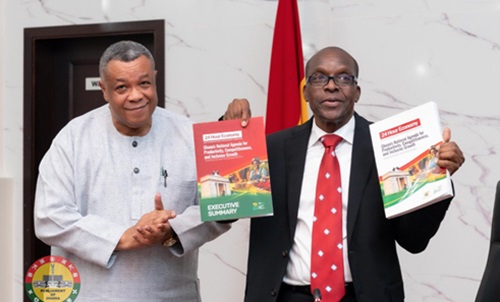The Speaker of Parliament, Alban Sumana Kingsford Bagbin, has called on the business community to scrutinise the government’s document on the 24-hour economy policy to enrich its content.
He said instead of business-minded people criticising the documents using political lenses, they must consider what difference they could make in the document’s content to support economic growth.
“Outside Ghana, the way they commend and see us, we are not tapping that value to our benefit because many of us are fond of criticising instead of taking advantage of the opportunities that are here,” he said.
Receiving the 24-hour document from the Presidential Advisor on the 24-hour economy, Goosie Tanoh, last Friday, Mr Bagbin said “those who are business-minded will take this and scrutinise it and see the difference that person can add to what government is going to do”.
The Speaker recalled that when the New Patriotic Party assumed power in 2001, then new President, John Agyekum Kufuor, called on the former government officials, particularly P. V. Obeng, now deceased, to propose to him how to set up his office to be able to run the country.
He said Mr Obeng contacted the leadership of Parliament, which included Mr Bagbin, then as Minority Leader, acknowledging that the new government needed support from all to ensure effective government.
Mr Bagbin said it was from one of the three options presented by Mr Obeng that formed the foundation for President Kufuor’s government.
The Speaker said if all Ghanaians were able to imbibe the various sub-programmes contained in the 24-hour economy document, it would be a catalyse for the implementation of the 24-hour economy.
Touching on the implementation of the 24-hour programme using Parliament, Mr Bagbin described Parliament as a place where the load of work was “unimaginable”.
“Parliaments that I know, not as vibrant and effective as our parliament, are having staff between 10,000 and 15,000.
“For the US and the rest, it is over 25,000, but here we are still struggling to get 1,000, and so we have a lot of opportunity to employ many people here and to push the agenda of development faster than we are doing,” he said.
The Speaker, however, said the mindset of the Ghanaians must change to guarantee the successful implementation of the 24-hour economy policy.
No categorisation
He warned that once people categorised the policy on partisan, religious or ethnic basis, it meant “we have not got it”.
“We have to make it a national programme,” he said, and proposed that after its launch, the document must be presented to the people's representatives to give it an official stamp of approval.
“Which means that we have to have the opportunity to debate it and approve and then you get the buy-in of all the organs of government,” he said.
Drawing a comparison, Mr Bagbin recalled that in 2020, he called for the document on the free senior high education for it to be brought for the House to approve it.
“That is part of the function of Parliament; we do not only deliberate but we give legitimacy by saying that the people we represent agree that this programme will work to their benefit with our approval.“
Once it does not come, we find it difficult ourselves to go back to the same people to advocate for them to accept it,” he said.
It’s a citizens’ programme
Mr Tanoh said the President would launch the 24-hour economy programme tomorrow as a policy intended to accelerate export development.
“We cannot, by any stretch of the imagination, not present you with the programme before that launch,” he said.
He said the programme was designed to transform production, with agriculture as its main anchor, and to develop value chains so that the country was able to achieve greater productivity for expanded output, to feed industry, to achieve food self-sufficiency, and to be able to export.
He said the programme was made up of three anchors-production transformation, supply chain and market efficiency as well as human capital development.
Mr Tanoh expressed worry over how the Ghanaian product was probably about two or three per cent higher than the foreign product during tender processes.
“And we opt for the foreign product and put our manufacturers at a disadvantage.
We must end that and use the state as a promoter of local manufacturing through the procurement practices that we adopt so that school uniforms, parliamentary service suits and all of that can be made in Ghana,” he said.

